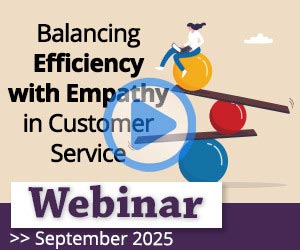‘Charisma’ is defined in the Oxford dictionary as ‘compelling attractiveness or charm’ and famous charismatic communicators include President Obama, George Clooney, Oprah Winfrey and Churchill. If Churchill is in the list then we know charisma isn’t just about good looks, there is a depth of something more underneath. Carolyn Blunt explores…
Why is communicating with charisma useful in a contact centre?
Communicating with charisma is useful for agents to gain a good rapport with customers, instil a positive impression of the organisation on callers, and to persuade, influence or sell over the telephone. Communicating with charisma is also helpful for managers, leaders and directors to cascade vision and inspire and motivate people to follow them.
Charisma inspires confidence and in times of recession it is invaluable for both customers and employees to feel confident. Yet while communicating with charisma comes naturally to some people it can be very elusive for others. The fact that it is difficult to describe and yet we ‘feel’ it when we hear it or see it has led some people to claim that charisma is a personality trait or gift that you either have naturally or you don’t.
We believe this is an excuse invented by people who can’t be bothered to learn how to be charismatic and make the effort to communicate with charisma – it does take effort if it isn’t your natural style, but it can definitely be learned and practised.
Here are five effective tips:
1. Be energetic – the light in the eyes of a charismatic person, the passion in their voice, the enthusiasm and conviction in their body language comes from their energy level. They enjoy their work and are committed to their industry, product or field. They show passion about the cause that rubs off on other people. This is partly how people feel inspired and motivated in their company.
You can be certain that being lethargic, bored or negative does not generate charisma – this makes others feel depleted or depressed when in your company. In practical terms, smile and ensure your posture isn’t slumped. Even on the telephone these elements affect your voice projection.
Get more sleep, take exercise and live well so your health and happiness shine through. To focus on what makes you a happy person spend some time thinking about your goals, your vision for your desired future and the steps to get there. If you are clear that you are working to achieve your vision it will make it easier to bounce out of bed in the morning.
2. Be interesting and show interest in other people – use inflection and emphasis in your voice tone to avoid monotony. Ensure that you are smiling, nodding and encouraging other people to talk. Listen and pay attention to what they tell you.
Shine your light on the other person to make them feel valued and happy in your presence. Remember, charismatic people aren’t arrogant. It is a two-way process that requires you to be genuine and sincere.
On the telephone ensure your product knowledge is the best it can be so that you aren’t stuck for things to say and that you can talk with purpose and fluency rather than ‘um…ah….I don’t know…’. Of course, for every agent there will be limits to what you can agree for a customer or the level of query you can answer.
Charisma can be still be present with the phrase: ‘That’s a good question. I will need to look into that for you.’ Deliver that with fluency and conviction and the caller will continue to have confidence in you and your organisation – so long as you keep your promises!
3. Listen to yourself – record and play back your own voice (yes, that really is how you sound!). Think about the volume, energy and speed of your voice. Is it too loud or too quiet? If you don’t sound confident you can’t expect others to have confidence in you and rate you as a confident, charismatic communicator. Volume should be appropriate to the situation, for example, speaking in a one-to-one situation requires less volume than delivering a presentation. Equally, talking too quickly or too slowly can be frustrating for your caller.
[If you are looking for help on how to deliver a presentation there are lots of tips on Presentation Magazine]
In practical terms if callers are saying ‘Sorry?’ ‘Pardon?’ ‘Can you repeat that?’ these are clues that you need to work on your voice. Ensure you are articulating clearly and avoiding regional slang that others may not understand.
For example, a colleague of mine was from a UK region where it was usual to say ‘brought’ instead of ‘bought’. This confused me on several occasions and distracted me while I worked it out and then had to play ‘catch up’ trying to follow the thread of the conversation.
4. Be emotionally aware and expressive – charismatic people are in touch with their emotions and open about showing them. This is what makes them expressive and compelling. When you are open about your own emotions you give others permission to do the same, which they can find liberating and inspiring.
For example, you can collect a handful of words that are much more interesting and powerful responses to the question ‘how are you today?’ than ‘fine’ or ‘good’ such as ‘marvellous’, ‘amazing’, ‘terrific’, ‘delightful’ or ‘wonderful’.
Use gestures to emphasise your words, even over the telephone this is a positive way of communicating with meaning. Make eye contact in face-to-face situations and show expression in your face. A word of warning though – being congruent is the key. If your voice and body language don’t match, people will not believe you and you will only undermine your credibility. The terrible video clips of Gordon Brown on You Tube only reinforce this!
5. Flick the switch – you don’t have to be charismatic 24/7! It can be a switch that you flick on when the context demands it. Relaxing at home in a track suit does not require you to be charismatic.
Communicating with charisma takes effort and concentration that is challenging to sustain if it is not your natural style.
However, if you practise these tips when on the telephone your success at sales or service will increase, benefiting you and your organisation and, most importantly, your callers.

Carolyn Blunt
Carolyn Blunt is a contact centre training expert with Real Results Training. If you enjoyed this article you might also like our free resources. Please visit www.real-results.co.uk and see the Members Area. For more information on training your advisers cost-effectively call 0161 408 2003
Author: Jonty Pearce
Published On: 7th Oct 2009 - Last modified: 18th Aug 2025
Read more about - Call Centre Management, Carolyn Blunt, Empathy, Management Strategies

















Very Interesting and useful article…